Research Design on Cardiovascular Diseases in Older Australians
VerifiedAdded on 2022/12/22
|17
|4432
|38
Report
AI Summary
This report presents a research design addressing cardiovascular diseases among the elderly population in Australia, a significant public health concern. The report begins with an executive summary outlining the prevalence of cardiovascular diseases, including coronary heart disease and cerebrovascular disease, and their impact on the Australian population, especially the elderly. It highlights the high prevalence of hypertension and the associated risks. The introduction provides background information on the scope of the problem, citing relevant statistics and data from Australian health organizations. A literature review explores the potential of music therapy in managing cardiovascular diseases, examining studies that support its effectiveness in reducing stress, anxiety, and improving the quality of life for cardiac patients. The report also discusses the physiological mechanisms by which music therapy may exert its beneficial effects. Furthermore, it explores the connection between psychological stress, including acute and chronic stress, and the development of cardiovascular diseases, emphasizing the importance of stress management as part of treatment. The report concludes with a discussion of potential research outcomes and significance, emphasizing the importance of addressing this critical health issue through further research.

Running head: RESEARCH DESIGN
Research Design
Name of the Student
Name of the University
Author Note
Research Design
Name of the Student
Name of the University
Author Note
Paraphrase This Document
Need a fresh take? Get an instant paraphrase of this document with our AI Paraphraser
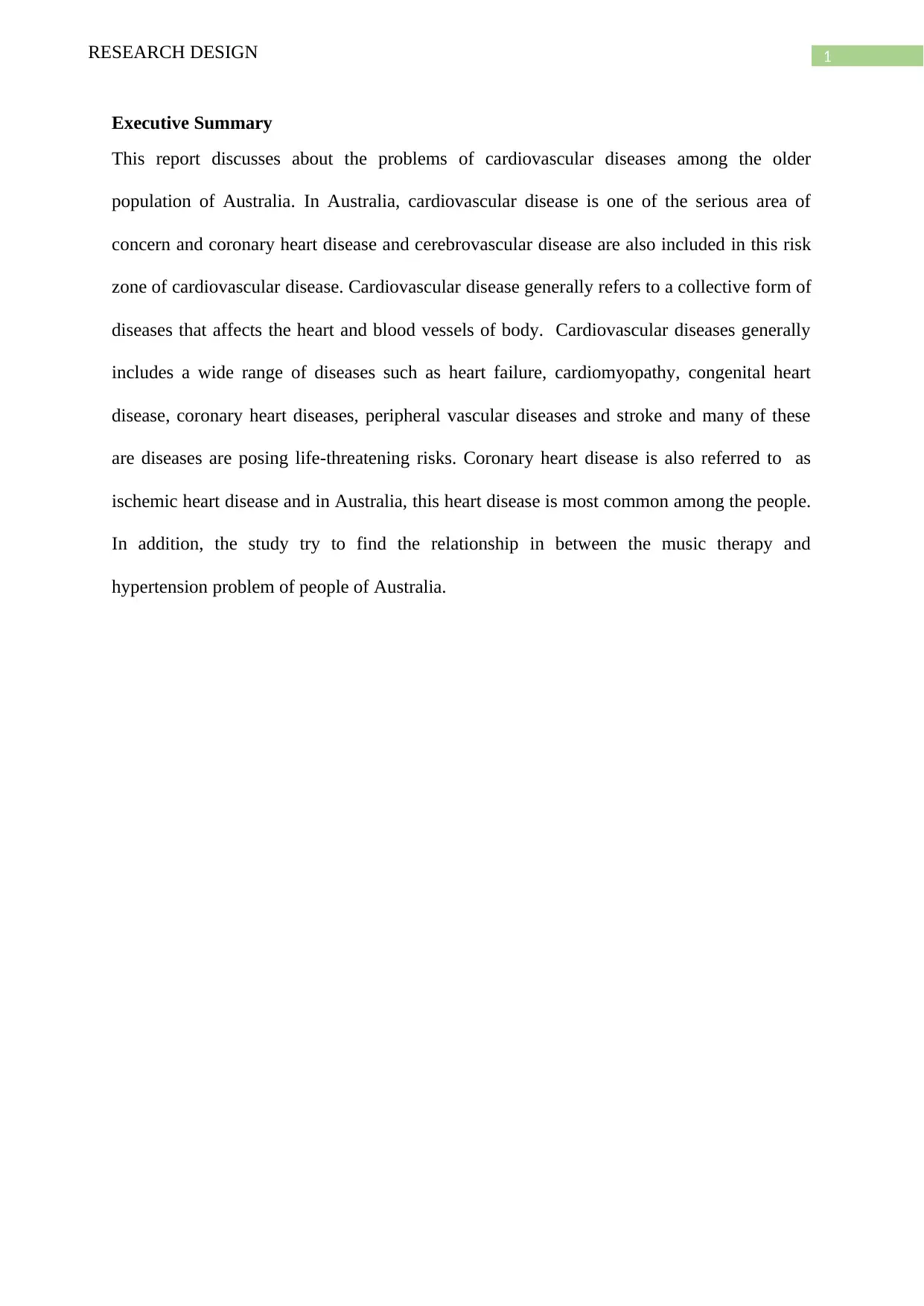
1RESEARCH DESIGN
Executive Summary
This report discusses about the problems of cardiovascular diseases among the older
population of Australia. In Australia, cardiovascular disease is one of the serious area of
concern and coronary heart disease and cerebrovascular disease are also included in this risk
zone of cardiovascular disease. Cardiovascular disease generally refers to a collective form of
diseases that affects the heart and blood vessels of body. Cardiovascular diseases generally
includes a wide range of diseases such as heart failure, cardiomyopathy, congenital heart
disease, coronary heart diseases, peripheral vascular diseases and stroke and many of these
are diseases are posing life-threatening risks. Coronary heart disease is also referred to as
ischemic heart disease and in Australia, this heart disease is most common among the people.
In addition, the study try to find the relationship in between the music therapy and
hypertension problem of people of Australia.
Executive Summary
This report discusses about the problems of cardiovascular diseases among the older
population of Australia. In Australia, cardiovascular disease is one of the serious area of
concern and coronary heart disease and cerebrovascular disease are also included in this risk
zone of cardiovascular disease. Cardiovascular disease generally refers to a collective form of
diseases that affects the heart and blood vessels of body. Cardiovascular diseases generally
includes a wide range of diseases such as heart failure, cardiomyopathy, congenital heart
disease, coronary heart diseases, peripheral vascular diseases and stroke and many of these
are diseases are posing life-threatening risks. Coronary heart disease is also referred to as
ischemic heart disease and in Australia, this heart disease is most common among the people.
In addition, the study try to find the relationship in between the music therapy and
hypertension problem of people of Australia.

2RESEARCH DESIGN
Table of Contents
Introduction.........................................................................................................................................3
Purpose of the research.......................................................................................................................9
Research Questions or Hypothesis...................................................................................................10
Methodology......................................................................................................................................10
Theoretical framework or conceptual framework..........................................................................10
Potential Research Outcomes and Significance...............................................................................11
References..........................................................................................................................................12
Table of Contents
Introduction.........................................................................................................................................3
Purpose of the research.......................................................................................................................9
Research Questions or Hypothesis...................................................................................................10
Methodology......................................................................................................................................10
Theoretical framework or conceptual framework..........................................................................10
Potential Research Outcomes and Significance...............................................................................11
References..........................................................................................................................................12
⊘ This is a preview!⊘
Do you want full access?
Subscribe today to unlock all pages.

Trusted by 1+ million students worldwide
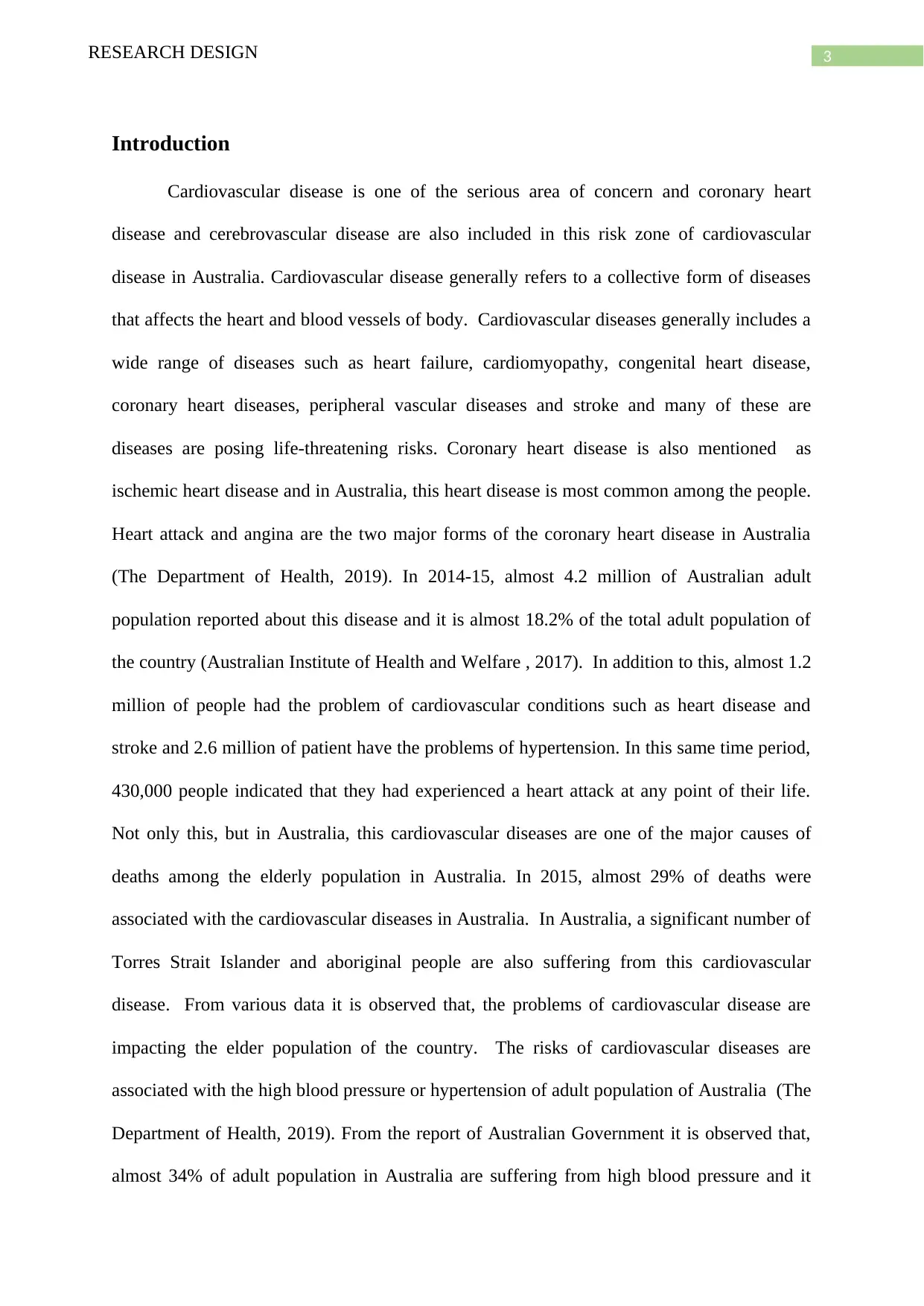
3RESEARCH DESIGN
Introduction
Cardiovascular disease is one of the serious area of concern and coronary heart
disease and cerebrovascular disease are also included in this risk zone of cardiovascular
disease in Australia. Cardiovascular disease generally refers to a collective form of diseases
that affects the heart and blood vessels of body. Cardiovascular diseases generally includes a
wide range of diseases such as heart failure, cardiomyopathy, congenital heart disease,
coronary heart diseases, peripheral vascular diseases and stroke and many of these are
diseases are posing life-threatening risks. Coronary heart disease is also mentioned as
ischemic heart disease and in Australia, this heart disease is most common among the people.
Heart attack and angina are the two major forms of the coronary heart disease in Australia
(The Department of Health, 2019). In 2014-15, almost 4.2 million of Australian adult
population reported about this disease and it is almost 18.2% of the total adult population of
the country (Australian Institute of Health and Welfare , 2017). In addition to this, almost 1.2
million of people had the problem of cardiovascular conditions such as heart disease and
stroke and 2.6 million of patient have the problems of hypertension. In this same time period,
430,000 people indicated that they had experienced a heart attack at any point of their life.
Not only this, but in Australia, this cardiovascular diseases are one of the major causes of
deaths among the elderly population in Australia. In 2015, almost 29% of deaths were
associated with the cardiovascular diseases in Australia. In Australia, a significant number of
Torres Strait Islander and aboriginal people are also suffering from this cardiovascular
disease. From various data it is observed that, the problems of cardiovascular disease are
impacting the elder population of the country. The risks of cardiovascular diseases are
associated with the high blood pressure or hypertension of adult population of Australia (The
Department of Health, 2019). From the report of Australian Government it is observed that,
almost 34% of adult population in Australia are suffering from high blood pressure and it
Introduction
Cardiovascular disease is one of the serious area of concern and coronary heart
disease and cerebrovascular disease are also included in this risk zone of cardiovascular
disease in Australia. Cardiovascular disease generally refers to a collective form of diseases
that affects the heart and blood vessels of body. Cardiovascular diseases generally includes a
wide range of diseases such as heart failure, cardiomyopathy, congenital heart disease,
coronary heart diseases, peripheral vascular diseases and stroke and many of these are
diseases are posing life-threatening risks. Coronary heart disease is also mentioned as
ischemic heart disease and in Australia, this heart disease is most common among the people.
Heart attack and angina are the two major forms of the coronary heart disease in Australia
(The Department of Health, 2019). In 2014-15, almost 4.2 million of Australian adult
population reported about this disease and it is almost 18.2% of the total adult population of
the country (Australian Institute of Health and Welfare , 2017). In addition to this, almost 1.2
million of people had the problem of cardiovascular conditions such as heart disease and
stroke and 2.6 million of patient have the problems of hypertension. In this same time period,
430,000 people indicated that they had experienced a heart attack at any point of their life.
Not only this, but in Australia, this cardiovascular diseases are one of the major causes of
deaths among the elderly population in Australia. In 2015, almost 29% of deaths were
associated with the cardiovascular diseases in Australia. In Australia, a significant number of
Torres Strait Islander and aboriginal people are also suffering from this cardiovascular
disease. From various data it is observed that, the problems of cardiovascular disease are
impacting the elder population of the country. The risks of cardiovascular diseases are
associated with the high blood pressure or hypertension of adult population of Australia (The
Department of Health, 2019). From the report of Australian Government it is observed that,
almost 34% of adult population in Australia are suffering from high blood pressure and it
Paraphrase This Document
Need a fresh take? Get an instant paraphrase of this document with our AI Paraphraser
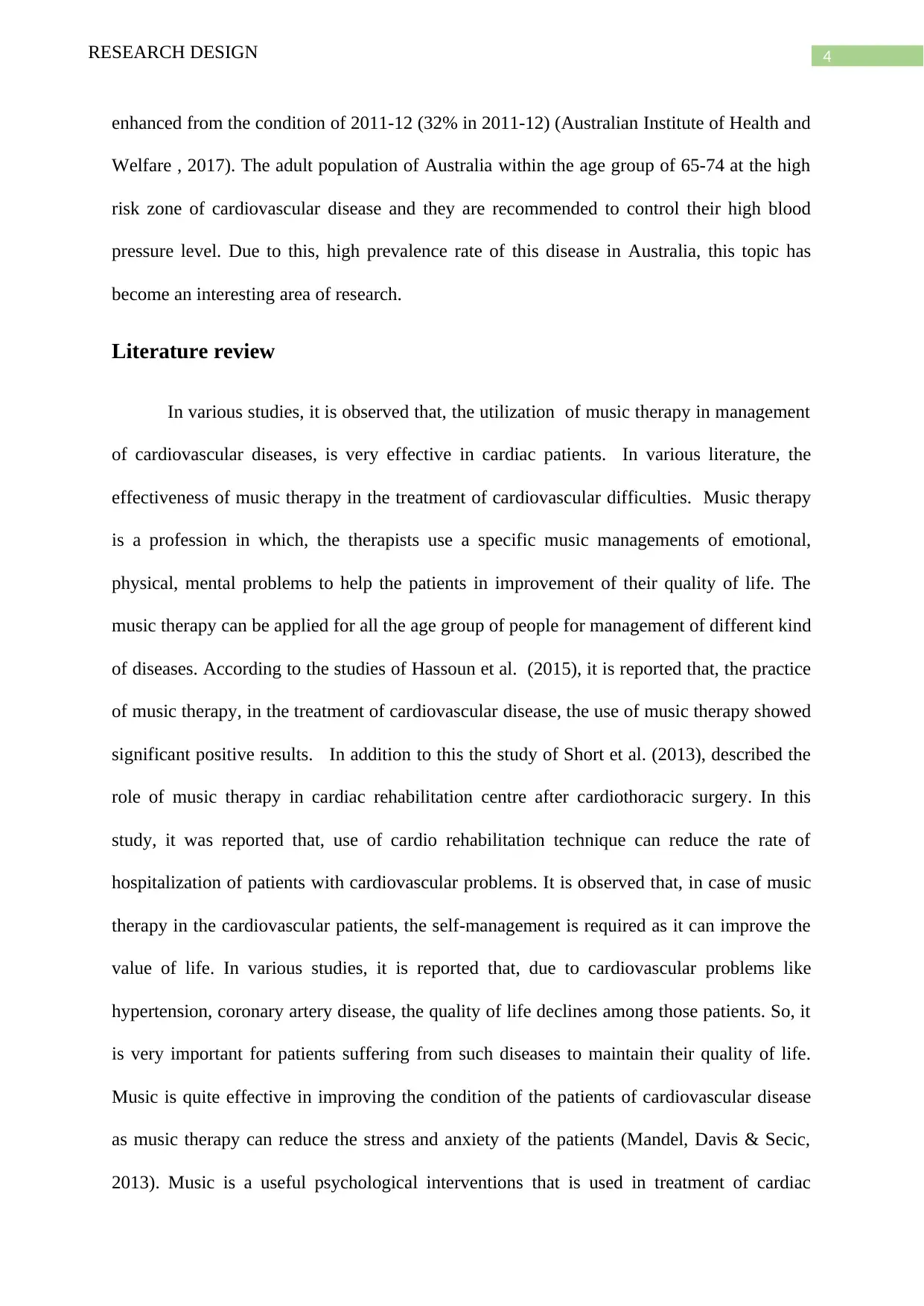
4RESEARCH DESIGN
enhanced from the condition of 2011-12 (32% in 2011-12) (Australian Institute of Health and
Welfare , 2017). The adult population of Australia within the age group of 65-74 at the high
risk zone of cardiovascular disease and they are recommended to control their high blood
pressure level. Due to this, high prevalence rate of this disease in Australia, this topic has
become an interesting area of research.
Literature review
In various studies, it is observed that, the utilization of music therapy in management
of cardiovascular diseases, is very effective in cardiac patients. In various literature, the
effectiveness of music therapy in the treatment of cardiovascular difficulties. Music therapy
is a profession in which, the therapists use a specific music managements of emotional,
physical, mental problems to help the patients in improvement of their quality of life. The
music therapy can be applied for all the age group of people for management of different kind
of diseases. According to the studies of Hassoun et al. (2015), it is reported that, the practice
of music therapy, in the treatment of cardiovascular disease, the use of music therapy showed
significant positive results. In addition to this the study of Short et al. (2013), described the
role of music therapy in cardiac rehabilitation centre after cardiothoracic surgery. In this
study, it was reported that, use of cardio rehabilitation technique can reduce the rate of
hospitalization of patients with cardiovascular problems. It is observed that, in case of music
therapy in the cardiovascular patients, the self-management is required as it can improve the
value of life. In various studies, it is reported that, due to cardiovascular problems like
hypertension, coronary artery disease, the quality of life declines among those patients. So, it
is very important for patients suffering from such diseases to maintain their quality of life.
Music is quite effective in improving the condition of the patients of cardiovascular disease
as music therapy can reduce the stress and anxiety of the patients (Mandel, Davis & Secic,
2013). Music is a useful psychological interventions that is used in treatment of cardiac
enhanced from the condition of 2011-12 (32% in 2011-12) (Australian Institute of Health and
Welfare , 2017). The adult population of Australia within the age group of 65-74 at the high
risk zone of cardiovascular disease and they are recommended to control their high blood
pressure level. Due to this, high prevalence rate of this disease in Australia, this topic has
become an interesting area of research.
Literature review
In various studies, it is observed that, the utilization of music therapy in management
of cardiovascular diseases, is very effective in cardiac patients. In various literature, the
effectiveness of music therapy in the treatment of cardiovascular difficulties. Music therapy
is a profession in which, the therapists use a specific music managements of emotional,
physical, mental problems to help the patients in improvement of their quality of life. The
music therapy can be applied for all the age group of people for management of different kind
of diseases. According to the studies of Hassoun et al. (2015), it is reported that, the practice
of music therapy, in the treatment of cardiovascular disease, the use of music therapy showed
significant positive results. In addition to this the study of Short et al. (2013), described the
role of music therapy in cardiac rehabilitation centre after cardiothoracic surgery. In this
study, it was reported that, use of cardio rehabilitation technique can reduce the rate of
hospitalization of patients with cardiovascular problems. It is observed that, in case of music
therapy in the cardiovascular patients, the self-management is required as it can improve the
value of life. In various studies, it is reported that, due to cardiovascular problems like
hypertension, coronary artery disease, the quality of life declines among those patients. So, it
is very important for patients suffering from such diseases to maintain their quality of life.
Music is quite effective in improving the condition of the patients of cardiovascular disease
as music therapy can reduce the stress and anxiety of the patients (Mandel, Davis & Secic,
2013). Music is a useful psychological interventions that is used in treatment of cardiac
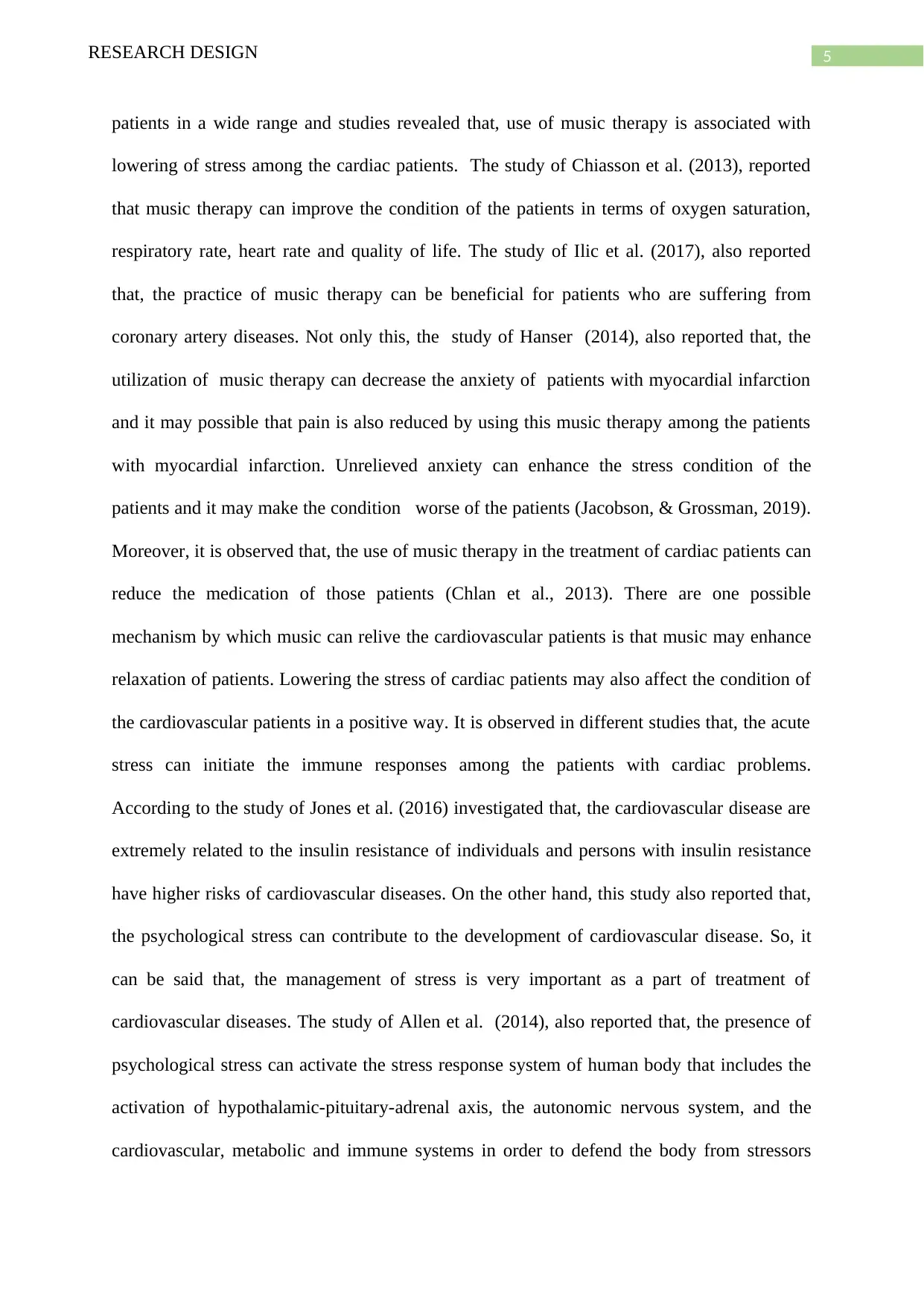
5RESEARCH DESIGN
patients in a wide range and studies revealed that, use of music therapy is associated with
lowering of stress among the cardiac patients. The study of Chiasson et al. (2013), reported
that music therapy can improve the condition of the patients in terms of oxygen saturation,
respiratory rate, heart rate and quality of life. The study of Ilic et al. (2017), also reported
that, the practice of music therapy can be beneficial for patients who are suffering from
coronary artery diseases. Not only this, the study of Hanser (2014), also reported that, the
utilization of music therapy can decrease the anxiety of patients with myocardial infarction
and it may possible that pain is also reduced by using this music therapy among the patients
with myocardial infarction. Unrelieved anxiety can enhance the stress condition of the
patients and it may make the condition worse of the patients (Jacobson, & Grossman, 2019).
Moreover, it is observed that, the use of music therapy in the treatment of cardiac patients can
reduce the medication of those patients (Chlan et al., 2013). There are one possible
mechanism by which music can relive the cardiovascular patients is that music may enhance
relaxation of patients. Lowering the stress of cardiac patients may also affect the condition of
the cardiovascular patients in a positive way. It is observed in different studies that, the acute
stress can initiate the immune responses among the patients with cardiac problems.
According to the study of Jones et al. (2016) investigated that, the cardiovascular disease are
extremely related to the insulin resistance of individuals and persons with insulin resistance
have higher risks of cardiovascular diseases. On the other hand, this study also reported that,
the psychological stress can contribute to the development of cardiovascular disease. So, it
can be said that, the management of stress is very important as a part of treatment of
cardiovascular diseases. The study of Allen et al. (2014), also reported that, the presence of
psychological stress can activate the stress response system of human body that includes the
activation of hypothalamic-pituitary-adrenal axis, the autonomic nervous system, and the
cardiovascular, metabolic and immune systems in order to defend the body from stressors
patients in a wide range and studies revealed that, use of music therapy is associated with
lowering of stress among the cardiac patients. The study of Chiasson et al. (2013), reported
that music therapy can improve the condition of the patients in terms of oxygen saturation,
respiratory rate, heart rate and quality of life. The study of Ilic et al. (2017), also reported
that, the practice of music therapy can be beneficial for patients who are suffering from
coronary artery diseases. Not only this, the study of Hanser (2014), also reported that, the
utilization of music therapy can decrease the anxiety of patients with myocardial infarction
and it may possible that pain is also reduced by using this music therapy among the patients
with myocardial infarction. Unrelieved anxiety can enhance the stress condition of the
patients and it may make the condition worse of the patients (Jacobson, & Grossman, 2019).
Moreover, it is observed that, the use of music therapy in the treatment of cardiac patients can
reduce the medication of those patients (Chlan et al., 2013). There are one possible
mechanism by which music can relive the cardiovascular patients is that music may enhance
relaxation of patients. Lowering the stress of cardiac patients may also affect the condition of
the cardiovascular patients in a positive way. It is observed in different studies that, the acute
stress can initiate the immune responses among the patients with cardiac problems.
According to the study of Jones et al. (2016) investigated that, the cardiovascular disease are
extremely related to the insulin resistance of individuals and persons with insulin resistance
have higher risks of cardiovascular diseases. On the other hand, this study also reported that,
the psychological stress can contribute to the development of cardiovascular disease. So, it
can be said that, the management of stress is very important as a part of treatment of
cardiovascular diseases. The study of Allen et al. (2014), also reported that, the presence of
psychological stress can activate the stress response system of human body that includes the
activation of hypothalamic-pituitary-adrenal axis, the autonomic nervous system, and the
cardiovascular, metabolic and immune systems in order to defend the body from stressors
⊘ This is a preview!⊘
Do you want full access?
Subscribe today to unlock all pages.

Trusted by 1+ million students worldwide
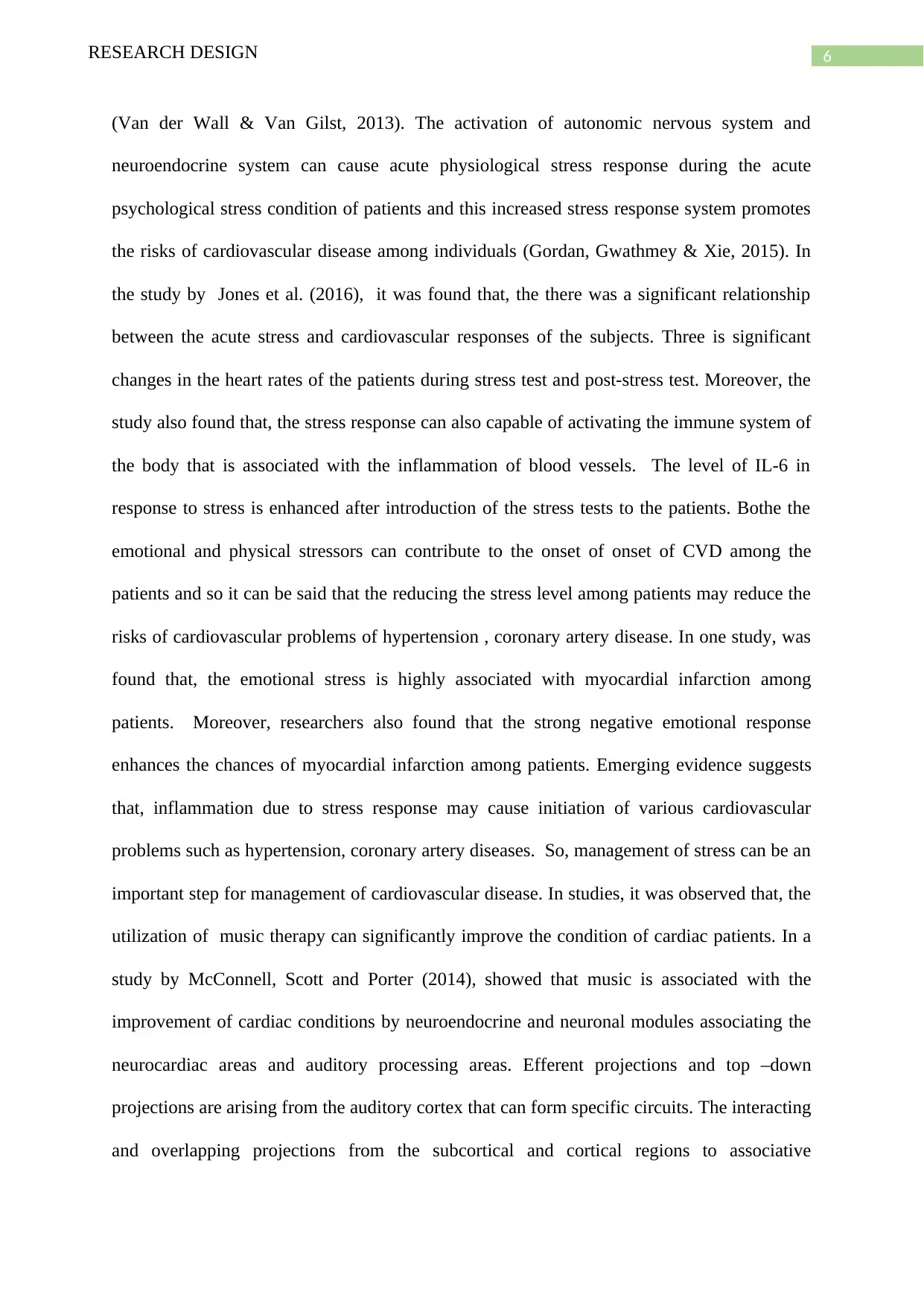
6RESEARCH DESIGN
(Van der Wall & Van Gilst, 2013). The activation of autonomic nervous system and
neuroendocrine system can cause acute physiological stress response during the acute
psychological stress condition of patients and this increased stress response system promotes
the risks of cardiovascular disease among individuals (Gordan, Gwathmey & Xie, 2015). In
the study by Jones et al. (2016), it was found that, the there was a significant relationship
between the acute stress and cardiovascular responses of the subjects. Three is significant
changes in the heart rates of the patients during stress test and post-stress test. Moreover, the
study also found that, the stress response can also capable of activating the immune system of
the body that is associated with the inflammation of blood vessels. The level of IL-6 in
response to stress is enhanced after introduction of the stress tests to the patients. Bothe the
emotional and physical stressors can contribute to the onset of onset of CVD among the
patients and so it can be said that the reducing the stress level among patients may reduce the
risks of cardiovascular problems of hypertension , coronary artery disease. In one study, was
found that, the emotional stress is highly associated with myocardial infarction among
patients. Moreover, researchers also found that the strong negative emotional response
enhances the chances of myocardial infarction among patients. Emerging evidence suggests
that, inflammation due to stress response may cause initiation of various cardiovascular
problems such as hypertension, coronary artery diseases. So, management of stress can be an
important step for management of cardiovascular disease. In studies, it was observed that, the
utilization of music therapy can significantly improve the condition of cardiac patients. In a
study by McConnell, Scott and Porter (2014), showed that music is associated with the
improvement of cardiac conditions by neuroendocrine and neuronal modules associating the
neurocardiac areas and auditory processing areas. Efferent projections and top –down
projections are arising from the auditory cortex that can form specific circuits. The interacting
and overlapping projections from the subcortical and cortical regions to associative
(Van der Wall & Van Gilst, 2013). The activation of autonomic nervous system and
neuroendocrine system can cause acute physiological stress response during the acute
psychological stress condition of patients and this increased stress response system promotes
the risks of cardiovascular disease among individuals (Gordan, Gwathmey & Xie, 2015). In
the study by Jones et al. (2016), it was found that, the there was a significant relationship
between the acute stress and cardiovascular responses of the subjects. Three is significant
changes in the heart rates of the patients during stress test and post-stress test. Moreover, the
study also found that, the stress response can also capable of activating the immune system of
the body that is associated with the inflammation of blood vessels. The level of IL-6 in
response to stress is enhanced after introduction of the stress tests to the patients. Bothe the
emotional and physical stressors can contribute to the onset of onset of CVD among the
patients and so it can be said that the reducing the stress level among patients may reduce the
risks of cardiovascular problems of hypertension , coronary artery disease. In one study, was
found that, the emotional stress is highly associated with myocardial infarction among
patients. Moreover, researchers also found that the strong negative emotional response
enhances the chances of myocardial infarction among patients. Emerging evidence suggests
that, inflammation due to stress response may cause initiation of various cardiovascular
problems such as hypertension, coronary artery diseases. So, management of stress can be an
important step for management of cardiovascular disease. In studies, it was observed that, the
utilization of music therapy can significantly improve the condition of cardiac patients. In a
study by McConnell, Scott and Porter (2014), showed that music is associated with the
improvement of cardiac conditions by neuroendocrine and neuronal modules associating the
neurocardiac areas and auditory processing areas. Efferent projections and top –down
projections are arising from the auditory cortex that can form specific circuits. The interacting
and overlapping projections from the subcortical and cortical regions to associative
Paraphrase This Document
Need a fresh take? Get an instant paraphrase of this document with our AI Paraphraser
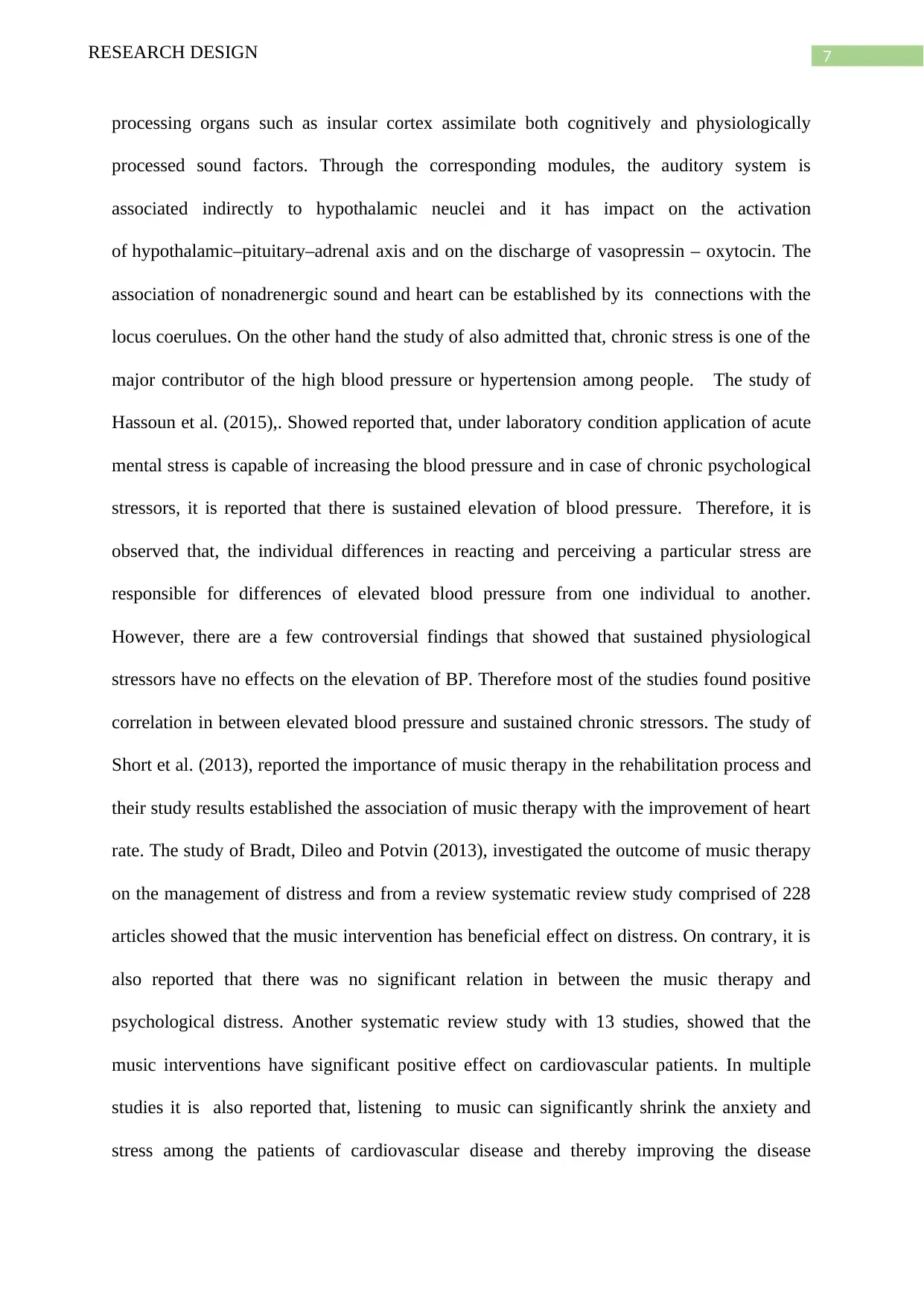
7RESEARCH DESIGN
processing organs such as insular cortex assimilate both cognitively and physiologically
processed sound factors. Through the corresponding modules, the auditory system is
associated indirectly to hypothalamic neuclei and it has impact on the activation
of hypothalamic–pituitary–adrenal axis and on the discharge of vasopressin – oxytocin. The
association of nonadrenergic sound and heart can be established by its connections with the
locus coerulues. On the other hand the study of also admitted that, chronic stress is one of the
major contributor of the high blood pressure or hypertension among people. The study of
Hassoun et al. (2015),. Showed reported that, under laboratory condition application of acute
mental stress is capable of increasing the blood pressure and in case of chronic psychological
stressors, it is reported that there is sustained elevation of blood pressure. Therefore, it is
observed that, the individual differences in reacting and perceiving a particular stress are
responsible for differences of elevated blood pressure from one individual to another.
However, there are a few controversial findings that showed that sustained physiological
stressors have no effects on the elevation of BP. Therefore most of the studies found positive
correlation in between elevated blood pressure and sustained chronic stressors. The study of
Short et al. (2013), reported the importance of music therapy in the rehabilitation process and
their study results established the association of music therapy with the improvement of heart
rate. The study of Bradt, Dileo and Potvin (2013), investigated the outcome of music therapy
on the management of distress and from a review systematic review study comprised of 228
articles showed that the music intervention has beneficial effect on distress. On contrary, it is
also reported that there was no significant relation in between the music therapy and
psychological distress. Another systematic review study with 13 studies, showed that the
music interventions have significant positive effect on cardiovascular patients. In multiple
studies it is also reported that, listening to music can significantly shrink the anxiety and
stress among the patients of cardiovascular disease and thereby improving the disease
processing organs such as insular cortex assimilate both cognitively and physiologically
processed sound factors. Through the corresponding modules, the auditory system is
associated indirectly to hypothalamic neuclei and it has impact on the activation
of hypothalamic–pituitary–adrenal axis and on the discharge of vasopressin – oxytocin. The
association of nonadrenergic sound and heart can be established by its connections with the
locus coerulues. On the other hand the study of also admitted that, chronic stress is one of the
major contributor of the high blood pressure or hypertension among people. The study of
Hassoun et al. (2015),. Showed reported that, under laboratory condition application of acute
mental stress is capable of increasing the blood pressure and in case of chronic psychological
stressors, it is reported that there is sustained elevation of blood pressure. Therefore, it is
observed that, the individual differences in reacting and perceiving a particular stress are
responsible for differences of elevated blood pressure from one individual to another.
However, there are a few controversial findings that showed that sustained physiological
stressors have no effects on the elevation of BP. Therefore most of the studies found positive
correlation in between elevated blood pressure and sustained chronic stressors. The study of
Short et al. (2013), reported the importance of music therapy in the rehabilitation process and
their study results established the association of music therapy with the improvement of heart
rate. The study of Bradt, Dileo and Potvin (2013), investigated the outcome of music therapy
on the management of distress and from a review systematic review study comprised of 228
articles showed that the music intervention has beneficial effect on distress. On contrary, it is
also reported that there was no significant relation in between the music therapy and
psychological distress. Another systematic review study with 13 studies, showed that the
music interventions have significant positive effect on cardiovascular patients. In multiple
studies it is also reported that, listening to music can significantly shrink the anxiety and
stress among the patients of cardiovascular disease and thereby improving the disease
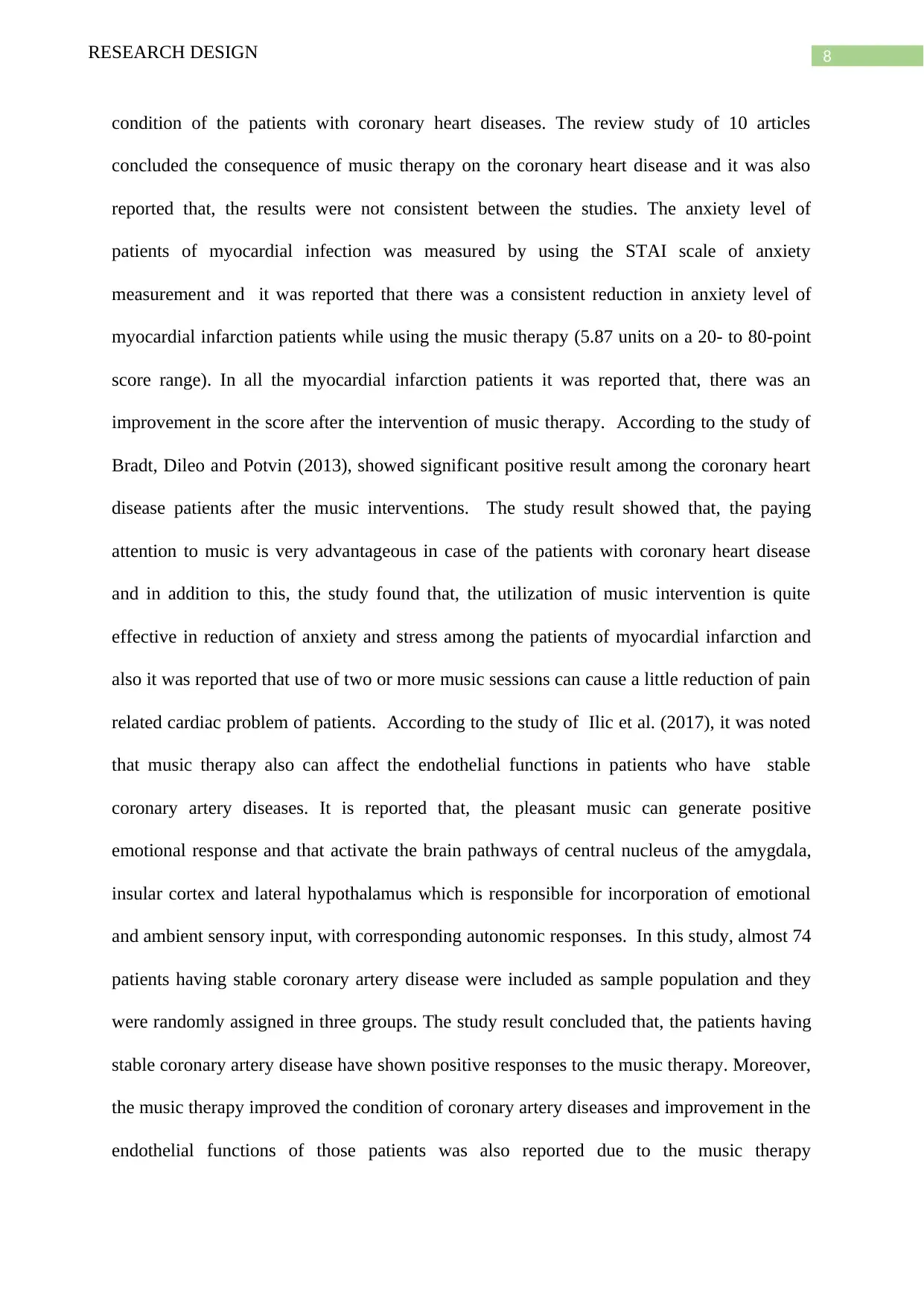
8RESEARCH DESIGN
condition of the patients with coronary heart diseases. The review study of 10 articles
concluded the consequence of music therapy on the coronary heart disease and it was also
reported that, the results were not consistent between the studies. The anxiety level of
patients of myocardial infection was measured by using the STAI scale of anxiety
measurement and it was reported that there was a consistent reduction in anxiety level of
myocardial infarction patients while using the music therapy (5.87 units on a 20- to 80-point
score range). In all the myocardial infarction patients it was reported that, there was an
improvement in the score after the intervention of music therapy. According to the study of
Bradt, Dileo and Potvin (2013), showed significant positive result among the coronary heart
disease patients after the music interventions. The study result showed that, the paying
attention to music is very advantageous in case of the patients with coronary heart disease
and in addition to this, the study found that, the utilization of music intervention is quite
effective in reduction of anxiety and stress among the patients of myocardial infarction and
also it was reported that use of two or more music sessions can cause a little reduction of pain
related cardiac problem of patients. According to the study of Ilic et al. (2017), it was noted
that music therapy also can affect the endothelial functions in patients who have stable
coronary artery diseases. It is reported that, the pleasant music can generate positive
emotional response and that activate the brain pathways of central nucleus of the amygdala,
insular cortex and lateral hypothalamus which is responsible for incorporation of emotional
and ambient sensory input, with corresponding autonomic responses. In this study, almost 74
patients having stable coronary artery disease were included as sample population and they
were randomly assigned in three groups. The study result concluded that, the patients having
stable coronary artery disease have shown positive responses to the music therapy. Moreover,
the music therapy improved the condition of coronary artery diseases and improvement in the
endothelial functions of those patients was also reported due to the music therapy
condition of the patients with coronary heart diseases. The review study of 10 articles
concluded the consequence of music therapy on the coronary heart disease and it was also
reported that, the results were not consistent between the studies. The anxiety level of
patients of myocardial infection was measured by using the STAI scale of anxiety
measurement and it was reported that there was a consistent reduction in anxiety level of
myocardial infarction patients while using the music therapy (5.87 units on a 20- to 80-point
score range). In all the myocardial infarction patients it was reported that, there was an
improvement in the score after the intervention of music therapy. According to the study of
Bradt, Dileo and Potvin (2013), showed significant positive result among the coronary heart
disease patients after the music interventions. The study result showed that, the paying
attention to music is very advantageous in case of the patients with coronary heart disease
and in addition to this, the study found that, the utilization of music intervention is quite
effective in reduction of anxiety and stress among the patients of myocardial infarction and
also it was reported that use of two or more music sessions can cause a little reduction of pain
related cardiac problem of patients. According to the study of Ilic et al. (2017), it was noted
that music therapy also can affect the endothelial functions in patients who have stable
coronary artery diseases. It is reported that, the pleasant music can generate positive
emotional response and that activate the brain pathways of central nucleus of the amygdala,
insular cortex and lateral hypothalamus which is responsible for incorporation of emotional
and ambient sensory input, with corresponding autonomic responses. In this study, almost 74
patients having stable coronary artery disease were included as sample population and they
were randomly assigned in three groups. The study result concluded that, the patients having
stable coronary artery disease have shown positive responses to the music therapy. Moreover,
the music therapy improved the condition of coronary artery diseases and improvement in the
endothelial functions of those patients was also reported due to the music therapy
⊘ This is a preview!⊘
Do you want full access?
Subscribe today to unlock all pages.

Trusted by 1+ million students worldwide
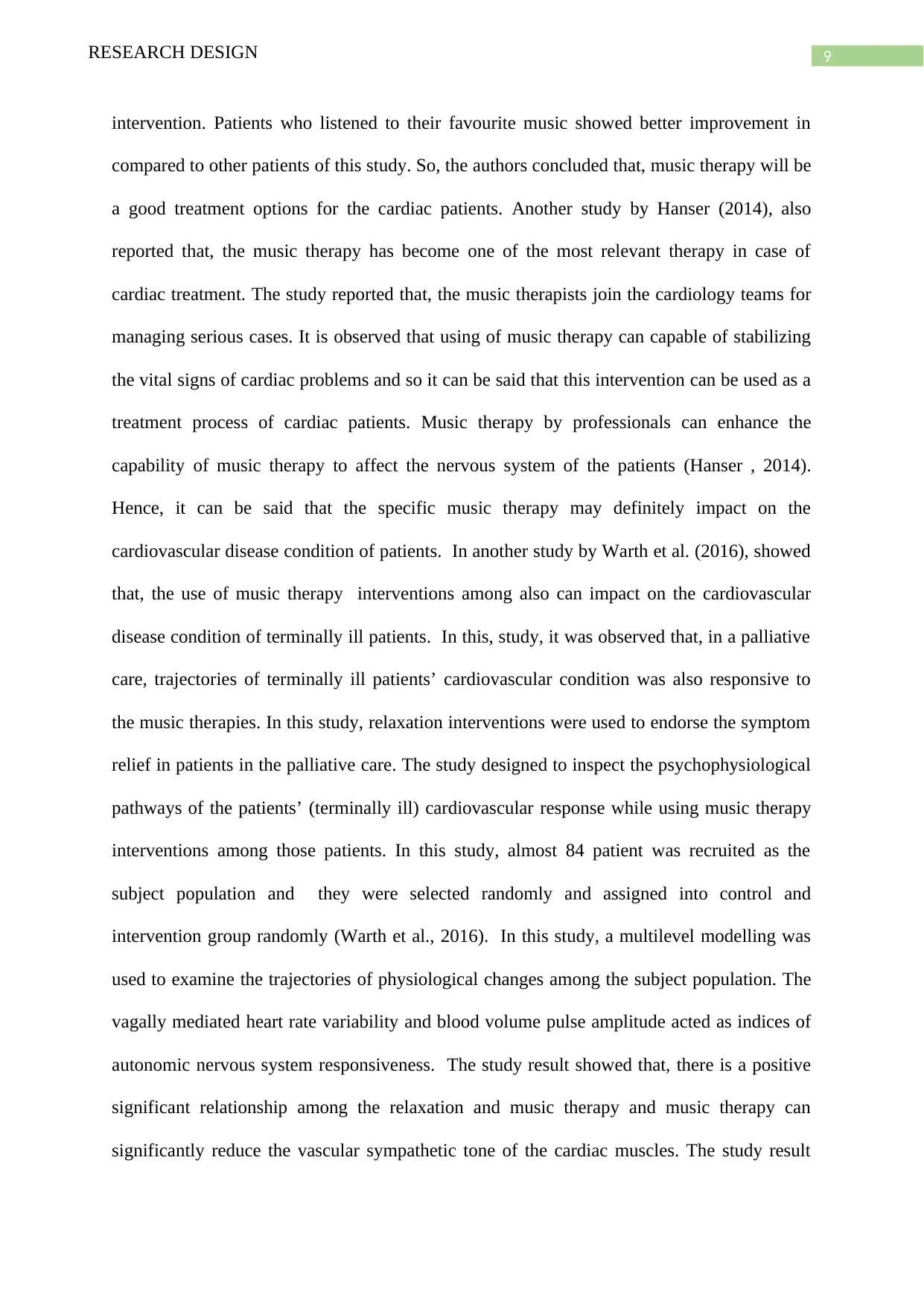
9RESEARCH DESIGN
intervention. Patients who listened to their favourite music showed better improvement in
compared to other patients of this study. So, the authors concluded that, music therapy will be
a good treatment options for the cardiac patients. Another study by Hanser (2014), also
reported that, the music therapy has become one of the most relevant therapy in case of
cardiac treatment. The study reported that, the music therapists join the cardiology teams for
managing serious cases. It is observed that using of music therapy can capable of stabilizing
the vital signs of cardiac problems and so it can be said that this intervention can be used as a
treatment process of cardiac patients. Music therapy by professionals can enhance the
capability of music therapy to affect the nervous system of the patients (Hanser , 2014).
Hence, it can be said that the specific music therapy may definitely impact on the
cardiovascular disease condition of patients. In another study by Warth et al. (2016), showed
that, the use of music therapy interventions among also can impact on the cardiovascular
disease condition of terminally ill patients. In this, study, it was observed that, in a palliative
care, trajectories of terminally ill patients’ cardiovascular condition was also responsive to
the music therapies. In this study, relaxation interventions were used to endorse the symptom
relief in patients in the palliative care. The study designed to inspect the psychophysiological
pathways of the patients’ (terminally ill) cardiovascular response while using music therapy
interventions among those patients. In this study, almost 84 patient was recruited as the
subject population and they were selected randomly and assigned into control and
intervention group randomly (Warth et al., 2016). In this study, a multilevel modelling was
used to examine the trajectories of physiological changes among the subject population. The
vagally mediated heart rate variability and blood volume pulse amplitude acted as indices of
autonomic nervous system responsiveness. The study result showed that, there is a positive
significant relationship among the relaxation and music therapy and music therapy can
significantly reduce the vascular sympathetic tone of the cardiac muscles. The study result
intervention. Patients who listened to their favourite music showed better improvement in
compared to other patients of this study. So, the authors concluded that, music therapy will be
a good treatment options for the cardiac patients. Another study by Hanser (2014), also
reported that, the music therapy has become one of the most relevant therapy in case of
cardiac treatment. The study reported that, the music therapists join the cardiology teams for
managing serious cases. It is observed that using of music therapy can capable of stabilizing
the vital signs of cardiac problems and so it can be said that this intervention can be used as a
treatment process of cardiac patients. Music therapy by professionals can enhance the
capability of music therapy to affect the nervous system of the patients (Hanser , 2014).
Hence, it can be said that the specific music therapy may definitely impact on the
cardiovascular disease condition of patients. In another study by Warth et al. (2016), showed
that, the use of music therapy interventions among also can impact on the cardiovascular
disease condition of terminally ill patients. In this, study, it was observed that, in a palliative
care, trajectories of terminally ill patients’ cardiovascular condition was also responsive to
the music therapies. In this study, relaxation interventions were used to endorse the symptom
relief in patients in the palliative care. The study designed to inspect the psychophysiological
pathways of the patients’ (terminally ill) cardiovascular response while using music therapy
interventions among those patients. In this study, almost 84 patient was recruited as the
subject population and they were selected randomly and assigned into control and
intervention group randomly (Warth et al., 2016). In this study, a multilevel modelling was
used to examine the trajectories of physiological changes among the subject population. The
vagally mediated heart rate variability and blood volume pulse amplitude acted as indices of
autonomic nervous system responsiveness. The study result showed that, there is a positive
significant relationship among the relaxation and music therapy and music therapy can
significantly reduce the vascular sympathetic tone of the cardiac muscles. The study result
Paraphrase This Document
Need a fresh take? Get an instant paraphrase of this document with our AI Paraphraser
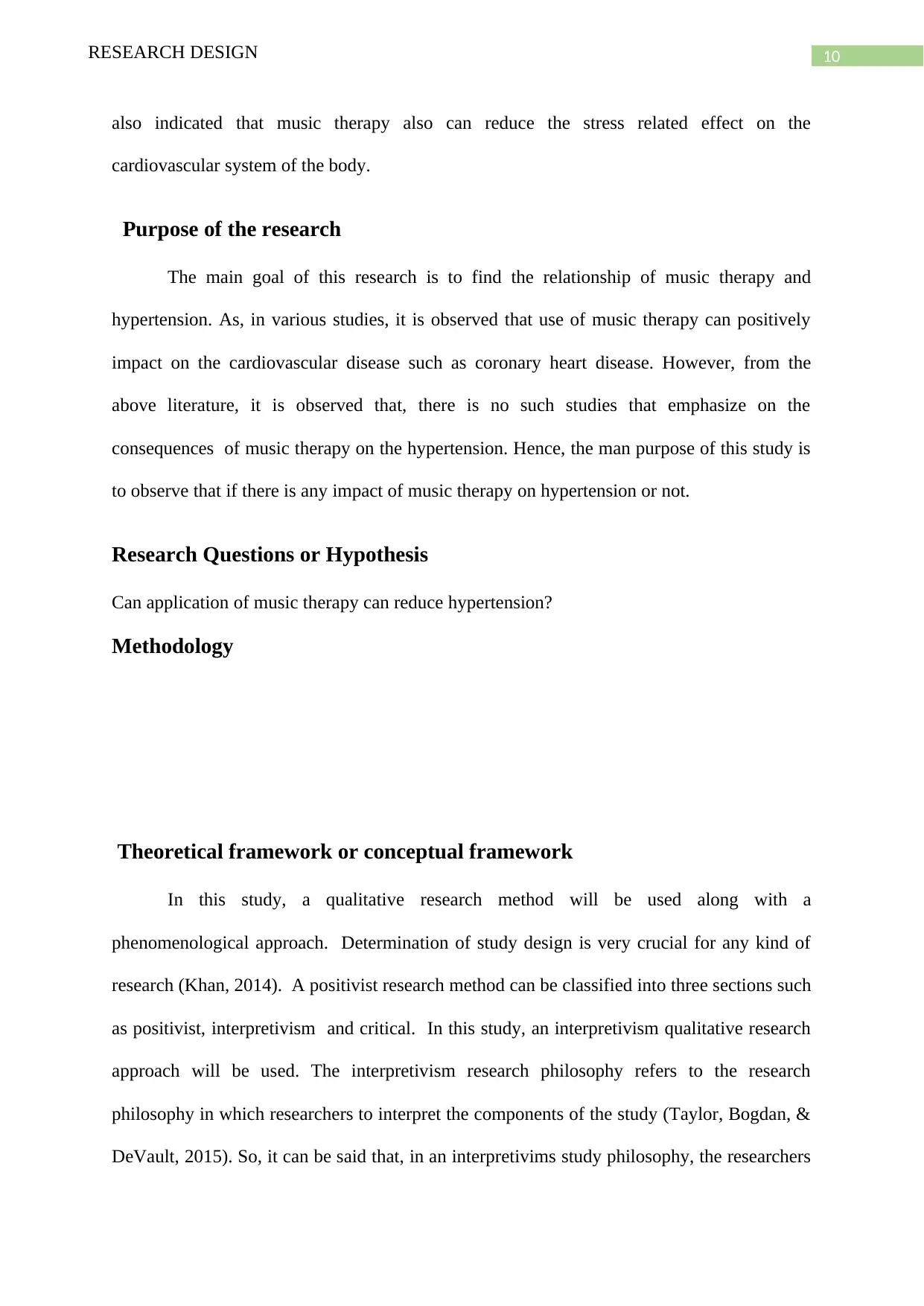
10RESEARCH DESIGN
also indicated that music therapy also can reduce the stress related effect on the
cardiovascular system of the body.
Purpose of the research
The main goal of this research is to find the relationship of music therapy and
hypertension. As, in various studies, it is observed that use of music therapy can positively
impact on the cardiovascular disease such as coronary heart disease. However, from the
above literature, it is observed that, there is no such studies that emphasize on the
consequences of music therapy on the hypertension. Hence, the man purpose of this study is
to observe that if there is any impact of music therapy on hypertension or not.
Research Questions or Hypothesis
Can application of music therapy can reduce hypertension?
Methodology
Theoretical framework or conceptual framework
In this study, a qualitative research method will be used along with a
phenomenological approach. Determination of study design is very crucial for any kind of
research (Khan, 2014). A positivist research method can be classified into three sections such
as positivist, interpretivism and critical. In this study, an interpretivism qualitative research
approach will be used. The interpretivism research philosophy refers to the research
philosophy in which researchers to interpret the components of the study (Taylor, Bogdan, &
DeVault, 2015). So, it can be said that, in an interpretivims study philosophy, the researchers
also indicated that music therapy also can reduce the stress related effect on the
cardiovascular system of the body.
Purpose of the research
The main goal of this research is to find the relationship of music therapy and
hypertension. As, in various studies, it is observed that use of music therapy can positively
impact on the cardiovascular disease such as coronary heart disease. However, from the
above literature, it is observed that, there is no such studies that emphasize on the
consequences of music therapy on the hypertension. Hence, the man purpose of this study is
to observe that if there is any impact of music therapy on hypertension or not.
Research Questions or Hypothesis
Can application of music therapy can reduce hypertension?
Methodology
Theoretical framework or conceptual framework
In this study, a qualitative research method will be used along with a
phenomenological approach. Determination of study design is very crucial for any kind of
research (Khan, 2014). A positivist research method can be classified into three sections such
as positivist, interpretivism and critical. In this study, an interpretivism qualitative research
approach will be used. The interpretivism research philosophy refers to the research
philosophy in which researchers to interpret the components of the study (Taylor, Bogdan, &
DeVault, 2015). So, it can be said that, in an interpretivims study philosophy, the researchers
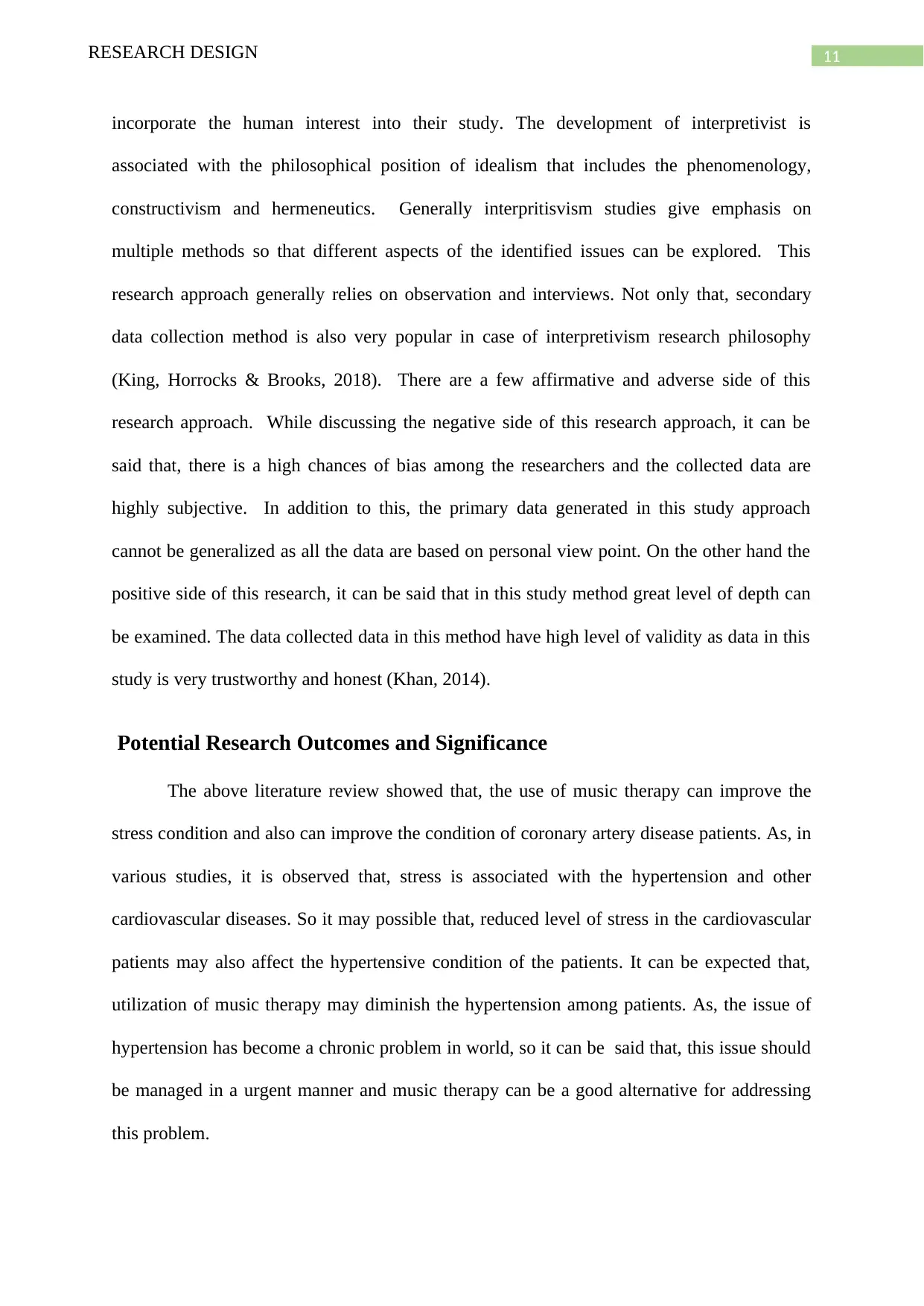
11RESEARCH DESIGN
incorporate the human interest into their study. The development of interpretivist is
associated with the philosophical position of idealism that includes the phenomenology,
constructivism and hermeneutics. Generally interpritisvism studies give emphasis on
multiple methods so that different aspects of the identified issues can be explored. This
research approach generally relies on observation and interviews. Not only that, secondary
data collection method is also very popular in case of interpretivism research philosophy
(King, Horrocks & Brooks, 2018). There are a few affirmative and adverse side of this
research approach. While discussing the negative side of this research approach, it can be
said that, there is a high chances of bias among the researchers and the collected data are
highly subjective. In addition to this, the primary data generated in this study approach
cannot be generalized as all the data are based on personal view point. On the other hand the
positive side of this research, it can be said that in this study method great level of depth can
be examined. The data collected data in this method have high level of validity as data in this
study is very trustworthy and honest (Khan, 2014).
Potential Research Outcomes and Significance
The above literature review showed that, the use of music therapy can improve the
stress condition and also can improve the condition of coronary artery disease patients. As, in
various studies, it is observed that, stress is associated with the hypertension and other
cardiovascular diseases. So it may possible that, reduced level of stress in the cardiovascular
patients may also affect the hypertensive condition of the patients. It can be expected that,
utilization of music therapy may diminish the hypertension among patients. As, the issue of
hypertension has become a chronic problem in world, so it can be said that, this issue should
be managed in a urgent manner and music therapy can be a good alternative for addressing
this problem.
incorporate the human interest into their study. The development of interpretivist is
associated with the philosophical position of idealism that includes the phenomenology,
constructivism and hermeneutics. Generally interpritisvism studies give emphasis on
multiple methods so that different aspects of the identified issues can be explored. This
research approach generally relies on observation and interviews. Not only that, secondary
data collection method is also very popular in case of interpretivism research philosophy
(King, Horrocks & Brooks, 2018). There are a few affirmative and adverse side of this
research approach. While discussing the negative side of this research approach, it can be
said that, there is a high chances of bias among the researchers and the collected data are
highly subjective. In addition to this, the primary data generated in this study approach
cannot be generalized as all the data are based on personal view point. On the other hand the
positive side of this research, it can be said that in this study method great level of depth can
be examined. The data collected data in this method have high level of validity as data in this
study is very trustworthy and honest (Khan, 2014).
Potential Research Outcomes and Significance
The above literature review showed that, the use of music therapy can improve the
stress condition and also can improve the condition of coronary artery disease patients. As, in
various studies, it is observed that, stress is associated with the hypertension and other
cardiovascular diseases. So it may possible that, reduced level of stress in the cardiovascular
patients may also affect the hypertensive condition of the patients. It can be expected that,
utilization of music therapy may diminish the hypertension among patients. As, the issue of
hypertension has become a chronic problem in world, so it can be said that, this issue should
be managed in a urgent manner and music therapy can be a good alternative for addressing
this problem.
⊘ This is a preview!⊘
Do you want full access?
Subscribe today to unlock all pages.

Trusted by 1+ million students worldwide
1 out of 17
Related Documents
Your All-in-One AI-Powered Toolkit for Academic Success.
+13062052269
info@desklib.com
Available 24*7 on WhatsApp / Email
![[object Object]](/_next/static/media/star-bottom.7253800d.svg)
Unlock your academic potential
Copyright © 2020–2026 A2Z Services. All Rights Reserved. Developed and managed by ZUCOL.





